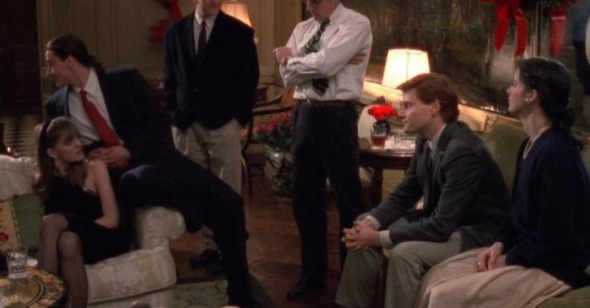Metropolitan
Dir. Whit Stillman, 1990, U.S., Criterion
by Nick Pinkerton
âAlmost everything Jane Austen wrote, looked at from todayâs perspective, is absurd,â says young Tom Townsend (Edward Clements), paraphrasing the literary critic Lionel Trilling with the blithe book-closed certainty of an amateur intellectual.
âHas it ever occurred to you that today looked at from Jane Austen's perspective would look even worse?â responds Metropolitanâs heroine Audrey Rouget (Carolyn Farina), in an unusually perceptive bit of undergrad analysis to counter her tentative love interest. Itâs a not-bad definition of the perspective from which Stillman wrote this, his exemplary first movie, the two films that followed it and, presumably, his fabled work-in-progress, set to combine two unfinished Austen novels. While never feeling antique, thereâs a solid moral grounding to his filmography that seems otherwise to belong to the 19th-century novel. As funny and brisk as his slim oeuvre is, itâs easy to overlook the distinctâif non-oppressiveâChristian ethical compass that centers it. But make no mistake, Metropolitan not accidentally has a cross formed from an office buildingâs lights as one of its earliest images, and has its spiritual center in a Mass at St. Thomas Church.
This might seem off-putting to some but, for this critic, grown into a sentimental Protestantism if not one of faith, the palpable decency of Stillmanâs films, as much as his well-turned dialogues, is essential to my affection. After watching one of his movies I find myself wanting to be betterâtiptoeing gingerly around tender feelings that I might otherwise stomp on, holding back on my drinking, and trying to be just a little more articulate. I even read Dale Carnegieâs How to Win Friends and Influence People (well, most of it) solely on the recommendation of BarcelonaâI should note that these personal revolutions remained underway for roughly the lifespan of a common cold, but this should more be attributed to the meagerness of my moral fiber than any artistic falsity.
Metropolitanâs action takes place in the course of one winter holiday in Manhattan, in the ranks of the self-appointed âSally Fowler Rat Pack,â the blue-blooded college Freshmen descendants of Park Avenue aristocracy thrown together in the spate of debutante season balls. The usual social machinations of a cloistered group environment are observed in the fishbowl of afterparties in poshly appointed salonsâaffections grow, rivalries are staked out, feelings are mangledâand the old âDo unto othersâŚâ of Luke 6:31, the various ways in which itâs bungled, unconsciously and unconscionably, in human interaction, become a constant concern. Audreyâs taken with Tom, the downwardly mobile outsider with facile Socialist leanings, while he, absorbed in the plot of his own adolescent melodrama, remains oblivious to the point of cruelty.
Though the ensemble, on the whole, seem a scotch older than the characters theyâre playing, thereâs a fidelity in their Awkward Age emotional peculiarities that makes them absolutely convincing. âIt might sound melodramatic to say that heâs âruined girlsâ⌠What does that really mean today?â says pedant Charlie Black (Taylor Nichols), fretting that ponytailed nouveau riche cad Rick Von Sloneker (a pampered slob you could imagine doing an on-camera confessional for HBOâs Born Rich) may be mustering an assault on Audreyâs maidenhead in Southampton. Of course for Charlie, and for a newly awakened Tom, that ruination means a great dealâthe particular concern with chastity in the English marriage novel of the 1800s matches up perfectly to the singular Puritanism of inexperienced, insecure young Romantic men in love.
Iâve never been at a loss for reasons to gush a few paragraphs about Eigeman, whoâs got probably the best comic delivery going, even if it hasnât gotten much display of late outside of Gilmore Girls and DVD commentaries. But the discovery on this go-around with Metropolitan was Carolyn Farina as the smart, slim-necked Ms. Rouget. Hers is a tenderly wrought performance of quiet presence, sensitive to the frailties of a cloistered debutanteâs heightened self-consciousness on suddenly finding herself an object of so much attention (Eigemanâs Nick Smith: âThese girls are at a very vulnerable point in their lives; all of this is much more emotional and difficult for them than it is for us. Theyâre on displayââand, indeed so many of her scenes are spent hunting stray eyelashes in the ladies room mirror, pouting over the frumpy shape of her gown, polishing her nails, or getting her legs waxed at the beautician). Seeing her admire her smooth calves with the cautious indulgence of newly-awakened pride is a just-perfect, totally contained actorâs moment, enough to frustrate you in contemplating the career Farina hasnât hadâthough sheâs at least allowed the distinction of never having been in a bad movie (Metropolitan, Little Noises, Age of Innocence, and Last Days of Disco, for the record).
Criterionâs DVD supplies a pristine package to a pristine film. Gone is the inappropriate cover of the old VHS edition, a golden-hued still of a strip poker game that seemed to promise a haute bourgeoisie sex farce (as a horny young teen, I was pissed after renting this tape from the Cincinnati Public Library), now replaced by a lovely crosshatched sketch, like something from a Thirties party invitation, by French artist Pierre Le Tan, who Stillmanâs family business, an agency for cartoonists and illustrators, once represented. Itâs of-a-piece with the filmâs non-period specific feeling of radiant nostalgia, which Stillman describes designing in an excellent commentary shared with Eigeman, Nichols, and editor Christopher Tellefsen. Stillman discusses filling his film about a fading milieu, itself an odd matching of Hollywood Golden Age elegance to the budgetless indie ethos, with as many endangered-seeming Old Manhattan monuments as possibleâ21 Club, the old Scribnerâs storefront, an extinct cafeteria on 44th Streetâto enhance its chairs-on-the-tables, âGoing Out of Businessâ atmosphere. Itâs enough to make this film, only 15 years old, seem like something from a distant, more-beautiful pastâa quality shared by many works that just seem too impossibly good to have been made by the sort of humans who swarm around us in our day-to-day.
